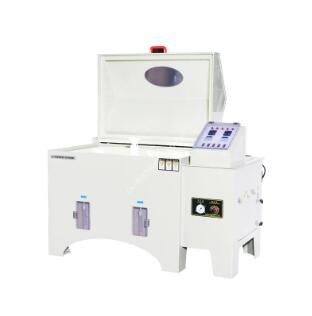Understanding the Importance of Salt Spray Test Equipment in Corrosion Testing
2024-08-12
Corrosion is a significant concern in industries that rely on metal components, and ensuring the longevity of these materials is crucial. This is where salt spray test equipment comes into play. In this blog, we'll explore what salt spray test equipment is, how it works, and why it's essential in corrosion testing.
1. What is Salt Spray Test Equipment?
Salt spray test equipment is a specialized chamber used to simulate and accelerate the corrosion process in a controlled environment. The primary purpose of this equipment is to assess the resistance of materials, coatings, and finishes to corrosion caused by salt-laden environments.
- Key Components: The equipment typically consists of a sealed chamber, a salt solution reservoir, a spray nozzle, and a heating system. The test specimens are placed inside the chamber, where they are exposed to a fine mist of saltwater solution.
- Testing Environment: The chamber replicates a highly corrosive environment by maintaining specific temperature and humidity conditions, ensuring a consistent and repeatable testing process.
2. How Does Salt Spray Testing Work?
Salt spray testing involves exposing test specimens to a saline mist over a set period. The process is designed to simulate the effects of long-term exposure to corrosive environments, allowing manufacturers to assess the durability and corrosion resistance of their products.
- Preparation: Test specimens are cleaned and prepared before being placed in the chamber. The salt solution, usually a sodium chloride solution, is prepared and atomized into a fine mist.
- Testing Procedure: The chamber's environment is carefully controlled, typically maintained at 35°C with a relative humidity of 95%. The specimens are exposed to the saline mist continuously for a predetermined duration, which can range from hours to weeks, depending on the test requirements.
- Evaluation: After the test, the specimens are examined for signs of corrosion, such as rust, pitting, or coating degradation. The results help determine the material's or coating's suitability for use in corrosive environments.
3. Applications of Salt Spray Test Equipment
Salt spray test equipment is widely used across various industries to evaluate the corrosion resistance of materials and coatings. Some of the key applications include:
- Automotive Industry: Manufacturers use salt spray testing to assess the durability of car parts, such as chassis components, fasteners, and exterior coatings, ensuring they can withstand harsh road conditions.
- Marine Industry: Given the constant exposure to saltwater, marine equipment and vessels undergo salt spray testing to evaluate the corrosion resistance of materials used in their construction.
- Aerospace Industry: Aircraft components, particularly those exposed to the elements, are tested for corrosion resistance to ensure safety and longevity.
- Construction Industry: Salt spray testing is used to assess the corrosion resistance of building materials, such as metal roofing, cladding, and structural components, especially in coastal areas.
4. Benefits of Using Salt Spray Test Equipment
Salt spray test equipment provides numerous benefits to manufacturers and industries that rely on corrosion-resistant materials.
- Accelerated Testing: The equipment allows for accelerated testing, meaning manufacturers can quickly assess the corrosion resistance of materials and coatings, reducing the time required for product development and quality control.
- Standardized Testing: Salt spray testing is standardized by international standards, such as ASTM B117 and ISO 9227, ensuring consistent and reliable results that can be compared across different tests and industries.
- Cost-Effective: By identifying potential corrosion issues early in the development process, manufacturers can avoid costly material failures and product recalls, ultimately saving time and money.
Conclusion
Salt spray test equipment plays a crucial role in corrosion testing, helping manufacturers ensure the durability and longevity of their products. By simulating corrosive environments in a controlled setting, this equipment provides valuable insights into how materials and coatings will perform in real-world conditions. Whether in the automotive, marine, aerospace, or construction industry, salt spray testing is an essential tool for maintaining product quality and reliability.



